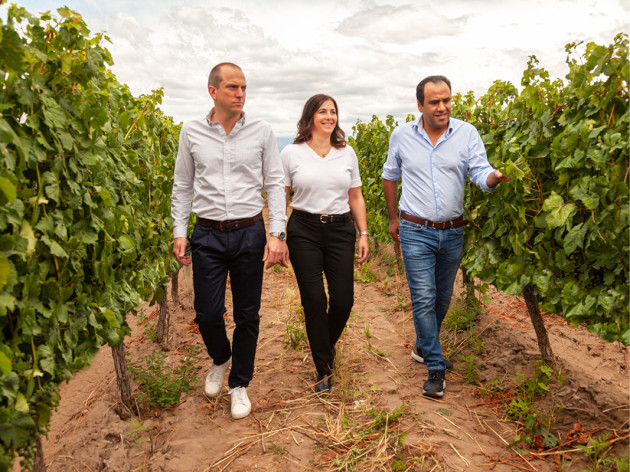
Headline Hero: Anne Bousquet, Domaine Bousquet
The owner of Domaine Bousquet talks all things organic and why Tupungato was the right fit for this style of winemaking
Why did you decide upon Tupungato – well off the beaten track at the time – for this ambitious wine project?
It was my father who first set eyes on this cool-climate locale, in the early 1990s. Back then, it was virgin terrain: tracts of semi-desert, nothing planted, no water above ground, no electricity and a single dirt track by way of access. Locals dismissed the area as too cold for growing grapes. My father, on the other hand, reckoned he’d found the perfect blend between his French homeland (high acidity, cool climate) and the New World (sunny, with a potential for relatively fruit-forward wines) – an ideal location in which to nurture organically grown wines.
What does ‘organic’ mean to you and how does this tie into what you describe as 360-degree sustainability?
Being organic was never a sales gimmick. Stewardship of the land is a necessity. We also understand that sustainability encompasses more than just organic fruit or a reduction in a carbon footprint. It includes economic sustainability for the surrounding community. We are aware that only by being successful can we provide much-needed jobs and opportunities for a poor, isolated community.
What has the impact been on the local environment and community and how important are those links?
When we set up in Tupungato, the area was a rural backwater (it still is), abandoned by a failing central government. That necessitated building an infrastructure from scratch. At the beginning, we joined an alliance of local wineries in funding construction of a new road providing better access for employees, material deliveries and a small, but growing number of tourists. We also immersed ourselves in training a local workforce new to winegrowing and office work.
Every detail had to be thought through, from transport for employees who didn’t own a car, to micro-loans for continuing education. Today, success stories abound. Our head of purchasing, for example, started out 10 years ago as an 18-year-old high school graduate on the bottling line. The wine industry has transformed the Tupungato economy and we consider this among our proudest achievements.
Why is consumer interest in organic and sustainable methods of production growing?
There are two reasons why organic wines are gaining ground. The first stems from a growing tendency around the world, especially among younger generations, to eat and drink healthier, and to adopt healthier lifestyles. That is why we see significant worldwide growth in sales of organic food.
The organic experience works for consumers, who are actively embracing the health benefits and quality of organic food in growing numbers. These are also people who care about the environmental benefits of supporting organically grown food and wines.
It wasn’t so long ago that consumers equated ‘organic’ with quality in food, but not quite as much in connection with wine. But, starting in the early 2000s, New World wine producers like ourselves began to concentrate on making high quality organic wines, and winning conventional wine consumers in growing numbers over to the organic wine category. Now we see more and more high-quality organic wines in the market from around the world, and with that has come a growing international audience for organically grown wines.
What differences do organic and biodynamic practices make to the wines themselves?
We believe that the healthier the vineyard, the better the fruit, and of course the wine. In other words, by nourishing the land and treating it with respect, we know that the land will reward us with its finest fruit. Organically grown vine roots penetrate deep into the soil, where they absorb the trace minerals that help to give our wines their authentic regional taste. For this reason, organically grown grapes can express the purity, intensity and varietal character of the local terroir.
What of the commercial side – does any of this pay dividends now or is that point still some way down the road?
Organic and biodynamic wines are growing worldwide. Though accounting for just 2% of
global wine consumption, demand for organic
and biodynamic wines continues to trend
high, consistently growing at an accelerated
rate over the past five years. Winemaking is a ‘millenary’ (i.e. spanning thousands of years) industry and traditionally slow to change.
That is no longer the case: Information now
is just a click away; we are increasingly attentive
to how each product is made, and respect the
brands that care about natural and sustainable processes. This makes organic and biodynamic
wines ever more attractive to consumers.
Top photo shows Anne Bousquet with her brother Guillaume Bousquet (left) and husband Labid Al Ameri (right), all of whom are partners at Domaine Bousquet.
Keywords:
- Domaine
- South America
- Harpers
- month
- report
- caught
- harpers caught
- part
- america
- bousquet
- anne
- heroes
- anne bousquet
- month harpers
- america report
- heroes anne bousquet
- anne bousquet domaine
- bousquet domaine bousquet
- month harpers caught
- south america report




